
- Blogs
- Ayuda
- Agregar un anuncio
- ES | GBP
- Acceso
- |
- Inscribirse
Aswan, Egypt
With its warm temperature and exotic plant islands, Aswan is a country of beauty and charm and a symbol of the Middle East. Rock Nile islands are also present all around the city, from the high dam to Edfu's north. While others work in the government, certain Nubian communities and islands make their living via farming and the sale of handcrafted goods.
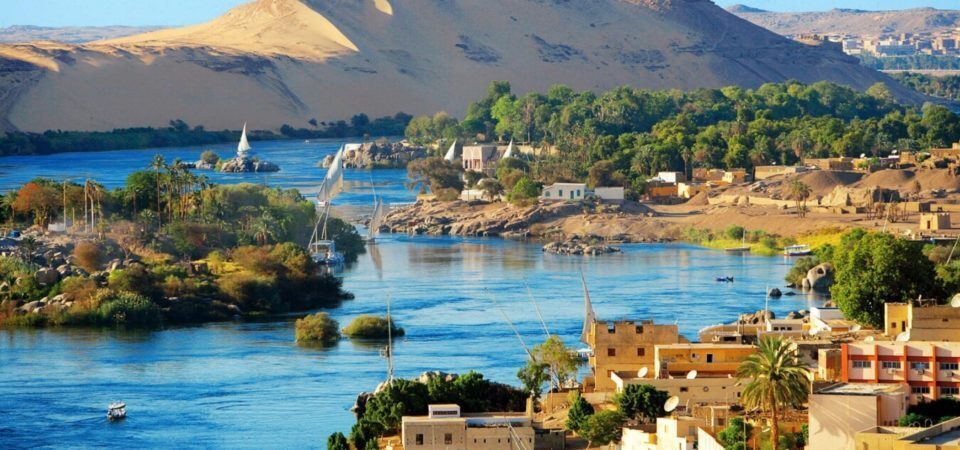
The neighboring islands, as well as the main city of Aswan, provide comprehensive services, including hospitals, schools, and transportation. Some of the islands are deserted because they are archaeological locations, such as the crocodile and elephantine islands, which served as a commerce route between Egypt and the rest of Africa. Aswan, along with Luxor, is considered as the main gateway to southern Egypt and an important economic source for the country.
Egypt is a must-see trip, with its magnificent pyramids, massive temples, and the world-famous Nile river cruise. Egypt is a must-see destination for all travellers; it is located in the north-eastern section of the African subcontinent. Egypt is predominantly a tourist destination known for the renowned Pyramids of Giza, Egypt Nile Cruises, The Great Sphinx of Giza, and Cairo's Egyptian Museum.
The best way to see the Nile is aboard a luxury cruise that travels between Aswan's historic landmarks.
If you wish to go on a blue trip, you should use our standard motor boat. Above all, we are concerned about the enjoyment of our visitors. Our competent team has big objectives. We guarantee that our visitors will have a nice and memorable experience with us. So come on, let's arrange your holiday!
Our boat measures 4 meters wide by 15 meters long. It can accommodate up to 50 people. In addition to a fully functional kitchen, a downstairs living room/dining area with air conditioning and fans, and a covered sundeck with tables and chairs, our double-decked motor boat includes two bathrooms with showers on the support boat.
The full day felucca sailing excursion begins at 9a.m. The felucca travels down the Nile towards the Aswan Bridge after the guests have had their welcome drinks. Traditional felucca sailing may be enjoyed by guests while reclining back and relaxing. While cruising and in between meals, cold beverages, tea, and coffee can be purchased for a small price on the felucca; however, tourists are encouraged to bring their own drinks and snacks.
Before crossing the Aswan Bridge, visitors can have tea, get henna tattoos, and/or smoke sheesha in a traditional Nubian village.
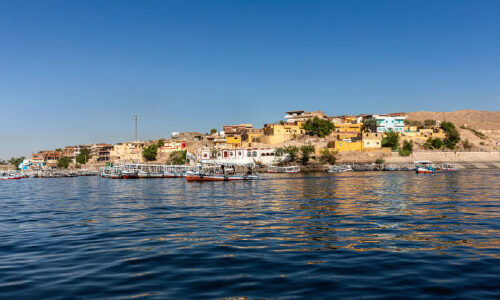
After seeing the Nubian Villlage we set sail for Aswan. Again, while sailing and in between meals, cold drinks, tea, and coffee can be purchased for a modest price on the felucca.Depending on the severity of the wind, we arrive at Aswan between 4p.m. and 5p.m. This is the end of the full day felucca adventure.
The River Nile
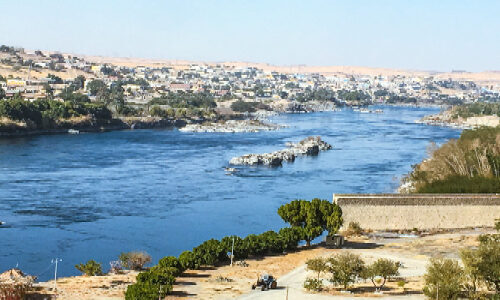
The Nile River is the world's longest river, stretching approximately 4,258 miles (6,853 kilometers). It has two major tributaries: the White Nile, which is considered the prime stream and headwaters, and the Blue Nile, which carries approximately two-thirds of the river's volume.
The Nile River and its banks are home to a diverse range of animal life. Rhinos, African tigerfish (the "piranha of Africa"), Nile monitors, hippopotamuses, wildebeests, baboons, frogs, mongooses, turtles, tortoises, and over 300 bird species are among them. This includes the highest concentrations of little gulls and whiskered terns in the world.
Destinations to visit
Kom Ombo Temple
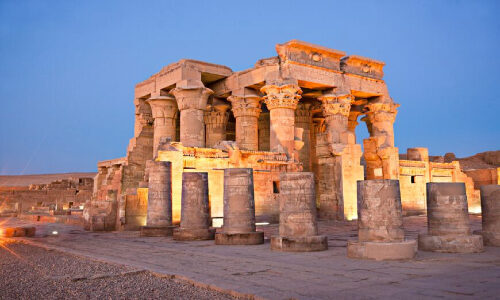
Kom Ombo, one of Ancient Egypt's most remarkable temples, was mostly constructed during the Ptolemaic Dynasty from 180 to 47 BCE, however there is evidence that it stood atop an older temple.
The temple is notable for its devotion to two distinct deities: the local crocodile-headed god Sobek and the Kingdom's first "god," the falcon-headed divinity Horus the Elder (also called Haroeris).
Apart from having a twin temple, the complex's layout is similar to that of the latter. One of the highlights of a visit to this temple is the Crocodile Museum, which displays some of the hundreds of mummified crocodiles unearthed nearby.
The Temple of Horus at Edfu
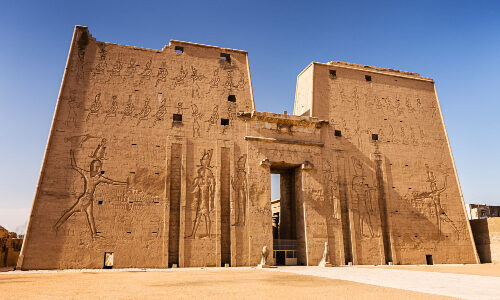
The Temple of Horus at Edfu is regarded as one of the most well-preserved Ancient Egyptian temples. The edifice was buried under over 40 feet (12 meters) of desert sand and Nile silt for 200 years, which helped to preserve it to near-perfection. The complex's biggest temple is devoted to Horus, one of Egypt's most prominent historic deities; sculptures of the falcon-headed god may be seen throughout.
Hatshepsut Temple
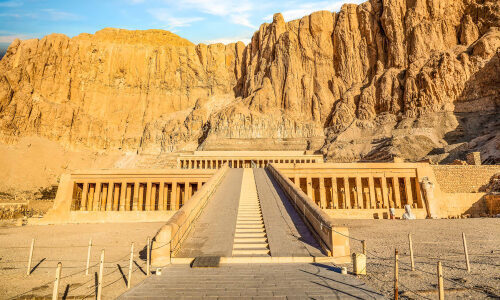
Hatshepsut's funerary temple is regarded as a work of art in ancient building. Its three huge terraces rise above the desert bottom and into Deir el-cliffs. Bahari's The entire structure points across the Nile to the massive Eighth Pylon. The major east-west axis was used to welcome Amun-barque Re's during the Festival of the Valley's finale.
The Colossi of Memnon
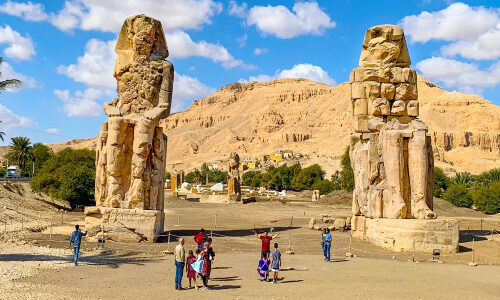
The Colossi of Memnon are two massive sculptures of 18th Dynasty Pharaoh Amenhotep III that were initially built to protect his funeral temple on the Nile's western bank, opposite Luxor.
Two huge sculptures of Pharaoh Amenhotep III are among the most stunning sites in Luxor, Egypt, on the west bank of the Nile. They were erected to protect his funeral shrine and are believed to weigh 720 tons apiece. Archaeologists are still excavating the complex, which is one of the world's most important archaeological sites.
The Karnak temple
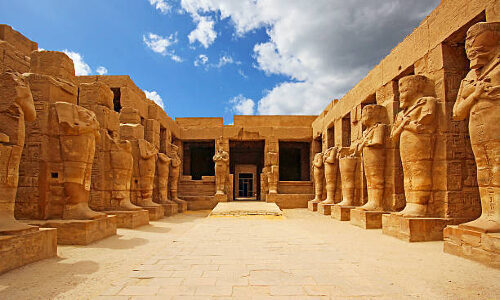
The Karnak temple, devoted to the deity Amon, his wife Mut, and their son Khonsu, is the grandest example of adoration in history. It was constructed between the commencement of the Middle Kingdom and the Graeco Roman Kingdom. Enjoy seeing Ramses II's Obelisk in front of the 1st Pilon. You will be returned to your hotel at the end of your trip.
Luxor temple
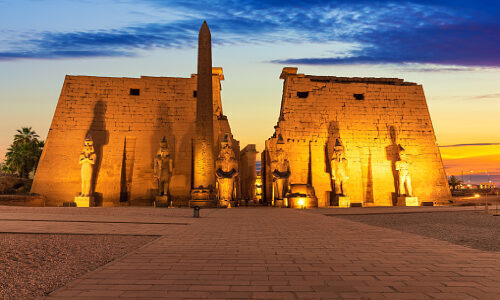
The Luxor Temple was erected during the time of Ramses I, "The Magnificent," who governed Egypt during the calm and stable 18th Dynasty. It was devoted to the Theban triad: the mighty deity Amon-Ra, his wife Mut, and their son Khonsu. During the 19th Dynasty, Ramses II built a new court and entrance. He constructed two granite obelisks with his names and titles, as well as six huge sculptures of himself, four standing and two reclining.
High Dam
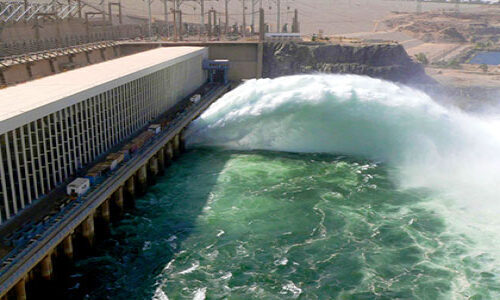
The Aswan Dam is located on the Nile River, just south of Aswan. The Aswan Low Dam was finished in 1902, while the Aswan High Dam was finished in 1970. Between 1960 and 1970, the High Dam was built. Its goal was to promote hydroelectric power generation, manage Nile floods, and boost agricultural productivity.
Philae Temples
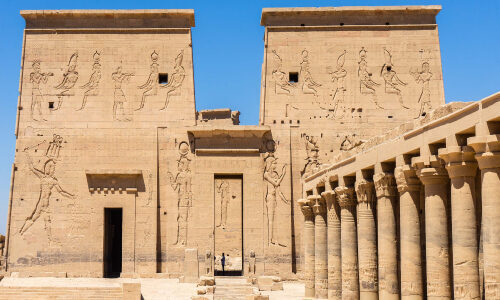
The Temple of Isis, devoted to the goddess of love and located on a beautiful island, was almost destroyed by floods when the Aswan Dam was erected in the 1960s. Fortunately, it was saved, and it is now one of Egypt's most magnificent and well-preserved ancient sanctuaries.
The Temple of Isis was one of the final temples dedicated to the Isis religion. It was revered for resurrecting her husband Osiris after he was slain and mutilated by his brother Seth. The hypostyle hall's columns are remarkably well-preserved, and reliefs depicting musical scenes in the Temple of Hathor have survived much of their old grandeur.
Booking Rules
Food and beverages Lunch is not included in this half-day excursion, and beverages can be purchased on board for an extra fee.
Reservations
• A booking should have a minimum of 15 persons and a maximum of 50 people.
• Full day and half-day reservations must be made two weeks in advance.
• By consulting with the Captain, you may plan the itinerary together.
• In terms of bookings and cancellation procedures, we request reservations at least two weeks before your intended sailing date. We would request a 10% payment at the time of booking.
What is included
• Fuel is included in the price
• We also provide private car transportation to cities other than Aswan, such as Luxor and Abu Simbel (modern vehicles with air-conditioning).
Cancellation policy
Cancellations are permitted up to three days before the scheduled sailing date, with a full refund provided until that time. If you cancel a booking fewer than 3 days before your scheduled sailing date, we impose a minor administration cost of 975 Egyptian pounds, or $50 USD in US currency.
Prices
£2,200 Egyptian pound (for up to 25 guests)
£4,400 Egyptian Pound (for up to 50 guests)
Este listado se enumera para las siguientes opciones de chárter.
Con capitán y tripulación
Basado en la opción de opción de alquiler establecida para este listado y su elección de aprovechar estas opciones bajo el proceso de reserva de esta carta, puede ser aplicable una tarifa adicional, por ejemplo; para aprovechar el servicio de la tripulación.
Se proporcionarán instrucciones exactas a la ubicación de salida después de una reserva confirmada.
Koszalin, Poland
Murarrie QLD, Australia
Bodrum, Muğla, Turkey
Neuquén, Argentina
Neuquén, Argentina
Neuquén, Argentina
Neuquén, Argentina